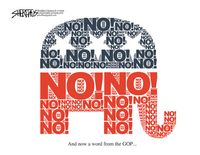Think of this as Volume 14, Number 10 of A-Clue.com, the online newsletter I've written since 1997. Enjoy.
One of the most difficult aspects of imposing a new political thesis is that, when you start, there's no vocabulary to describe it.
Every political era develops its own vocabulary as well as its own belief system. Once these are imposed, a generation has a common set of touchstones with which to discuss policy.
Lincoln's concept of Union meant southerners were subservient to the north's political will, and could only take command of the government through a loose coalition that included northern political machines and political reformers. Republicans could “wave the bloody shirt” if Democrats became too overt, and did.
- Theodore Roosevelt's concept of Progressivism offered a common vocabulary based on progress, on the public good, on the need to balance the interests of the rich and the poor slowly and carefully. In practice this is very close to the Obama Thesis of Consensus.
- Franklin Roosevelt's concept of Unity meant that “politics stops at the water's edge,” and that all groups had a stake in what the nation was doing through the growth of the middle class, that everyone in fact was part of the middle class.
- Richard Nixon's concept of Conflict held that majorities had to protect themselves from various minorities. Only those who were inside the Thesis deserved protection. Outsiders (and this concept eventually extended to all Democrats) were suspect. Their motives were not those of “us,” they were “them” and they had to be defeated for “us” to be safe.
In practice the Nixon Thesis worked by constantly narrowing the definition of “us” when the coalition grew too large. This was necessary to maintain the sense of being surrounded necessary for the assumptions to be maintained.

The final coalition, under George W. Bush, wound up having a lot in common with coalitions of church, oligarchs, and soldiers who have controlled Latin America under caudillos for two centuries, with disastrous results. It was no surprise that America ran off the rails. You run your country like Argentina and you're going to get Argentine results.
This is a long-winded way of saying that there is no present vocabulary for how President Obama wants politics to work. The Roosevelts are dead and can't be resurrected.

The irony is that Health Care Reform should be a no-brainer. If Republicans really believe that health care is a privilege, a choice, how can they accept the existence of Medicare and Medicaid? In rhetoric, they can't, even if in practice they must. Even the cost-benefit success of the VA and military health systems must be questioned, because it conflicts with ideology.
What grassroots Republicans wind up endorsing is a system where the poor are taken care of, and the elderly are taken care of, and even children are taken care of as a matter of right, but the broad middle class – the people their Thesis was supposedly designed to defend – are left without real health care of any kind. Working people can no longer afford what insurers and hospitals must charge in order to make up for losses those for whom an entitlement exists.
It's really crazy. An unemployed New Yorker has better access to, and a greater entitlement to health care, than a hard-working middle class family in Atlanta or Houston. In practice it's indefensible.
But ideology is not about practice. It's not about reality. It's about an ideal. Those who support the ideal will be protected, those who oppose it must be destroyed.
But here's the lesson. At a time of crisis you may proclaim a new set of rules, but you must play with the rules as you're given them by the past. Only the past can control the future.

Barack Obama has no choice. He must play this hand by Nixon's rules. You can't impose new rules until you've won enough hands that the old rules no longer apply. That means narrow, partisan majorities, and intense organization of his own people against the common enemy that is the modern Republican Party.
Even though he doesn't believe Republicans have any ill motives, he must in the near term convince the rest of us they do, or we go back to Argentina and America will never come back.











Dana,
Interesting piece. It does – as usual – take me some time to distill the blog into it’s essence, and it’s this:
– you think republicans inherently have ill motives;
– you think democrats/liberals inherently have good motives.
And pas presidents are labeled that way, period. It’s either black or white (figuratively speaking).
To which I say: not so. Every president had it’s good and bad points. As for the way society is going – that’s where the real divide is: liberals want more government, more taxes, less freedom, more accusations (“what you’ve worked for is not yours – we know better how to spend it”), and republicans – although not clean by any means – less so.
Americans in general tend to disagree with the president’s socialist agenda. November will come soon.
As for healthcare – wouldn’t a back-to-basics and one-problem-at-a-time approach be more effective? That way you can actually get votes from Republicans. The very simple reason they vote against the current package is simple – they see what it really is and they dislike it: a government take-over of a large part of the economy. That goes against the grain of the way THEY would like to see the society moving. A simple acknowledgement – and acceptance – of that fact (hey, they also live in the the USA and are your neighbours) would go a long way in mending the relationships.
No party is inherently evil, neither are people.
My 2 cents.
Dana,
Interesting piece. It does – as usual – take me some time to distill the blog into it’s essence, and it’s this:
– you think republicans inherently have ill motives;
– you think democrats/liberals inherently have good motives.
And pas presidents are labeled that way, period. It’s either black or white (figuratively speaking).
To which I say: not so. Every president had it’s good and bad points. As for the way society is going – that’s where the real divide is: liberals want more government, more taxes, less freedom, more accusations (“what you’ve worked for is not yours – we know better how to spend it”), and republicans – although not clean by any means – less so.
Americans in general tend to disagree with the president’s socialist agenda. November will come soon.
As for healthcare – wouldn’t a back-to-basics and one-problem-at-a-time approach be more effective? That way you can actually get votes from Republicans. The very simple reason they vote against the current package is simple – they see what it really is and they dislike it: a government take-over of a large part of the economy. That goes against the grain of the way THEY would like to see the society moving. A simple acknowledgement – and acceptance – of that fact (hey, they also live in the the USA and are your neighbours) would go a long way in mending the relationships.
No party is inherently evil, neither are people.
My 2 cents.
Republicans don’t denounce Xe (Blackwater). Their major source of funding is the government. Defense contract work has gone up and up.
Liberals don’t want more government. At least the smart ones don’t. They want solutions. Whether they come from the public or private sector does not matter.
Why liberals like socialized health care is because they think it works in other countries. They also know that Medicare and Medicaid are socialized health care.
Liberals/progressives are pushing hard on net neutrality. Not Republicans/conservatives. There has finally been some breakthrough although Democrats (not liberals or progressives mind you) are controlled by Big Media.
For example on environmental issues – Liberals/Progressives are for non-profits like the Nature Conservancy. I see no BIG government there.
Entrepreneurship is not about being “Business Friendly”. Smart liberals know this. See Google and Apple. Being “Business Friendly” in my opinion is code for keeping things the same. It is for slowing down progress. Dana’s point is that opportunities are there. Stop complaining about Socialism and do something.
Republicans don’t denounce Xe (Blackwater). Their major source of funding is the government. Defense contract work has gone up and up.
Liberals don’t want more government. At least the smart ones don’t. They want solutions. Whether they come from the public or private sector does not matter.
Why liberals like socialized health care is because they think it works in other countries. They also know that Medicare and Medicaid are socialized health care.
Liberals/progressives are pushing hard on net neutrality. Not Republicans/conservatives. There has finally been some breakthrough although Democrats (not liberals or progressives mind you) are controlled by Big Media.
For example on environmental issues – Liberals/Progressives are for non-profits like the Nature Conservancy. I see no BIG government there.
Entrepreneurship is not about being “Business Friendly”. Smart liberals know this. See Google and Apple. Being “Business Friendly” in my opinion is code for keeping things the same. It is for slowing down progress. Dana’s point is that opportunities are there. Stop complaining about Socialism and do something.